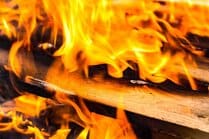Your Studio May Be Safe From A Wildfire, But Not From The Insurance Company
In this piece we look at how a bit of good fortune can quickly transform into a cautionary tale, as was the case with Richard and Linda Gibbs after their legendary recording studio survived a devastating fire only for the couple to discover they were radically under-insured.
Guest post by Bobby Owsinski of Music 3.0
When composer Richard Gibbs and his wife Linda lost their home in Malibu in the Woolsey Wildfire of November 2018, the one silver lining was that their world-class recording studio was left standing and mostly untouched. Woodshed Recording, built in a detached former barn on the Gibbs property, has long been one of the most sought-after studios in Los Angeles and used by high-profile artists like U2, Coldplay, Sting, Shawn Mendes, Chance the Rapper, Barbra Streisand, Lady Gaga and many more. While the studio remained intact, Richard and Linda’s house and everything in it was turned into little more than ashes.
In trying to recover and rebuild from the fire, Richard learned a lot about fire science and why the studio was spared. It turns out that during a wildfire, the fire itself may only be a problem for a short period of time as it quickly passes over a structure and the available fuel around it is consumed. The real problem comes from the embers. Hot embers are blown by the wind inside a home via its vents, causing it to catch fire from the inside out rather than from the outside like many assume. A stand-alone recording studio is naturally airtight in order to create the maximum isolation from sounds coming from the inside or outside, giving those hot embers no place to enter and ignite any combustible materials it touches. Despite having cedar paneling painted with a somewhat flammable marine sealant on the outside of the studio, the Woodshed was spared.

Of course, other factors played into the studio’s safety as well. Linda’s lush permaculture gardens surrounding the studio proved to be a moist fire buffer, and the lack of natural fuel around the facility proved to be an important protection ingredient. Woodshed Recording was back up and running within five months of the tragedy, which was the soonest that power could be restored.
But the nightmare was actually about to escalate, as the battle with the insurance company over the house rebuild was making some heat of its own. The house was actually an important component of the studio’s ability to provide the expected world-class service to its clients, serving as a kitchen and dining area for meals, and even as a temporary residence for artists that needed total immersion in their work.
The Gibbs family had purchased what they believed to be a thorough homeowners insurance policy from State Farm in 1997 when they bought their home, which was designed to cover all of their possessions along with the house. Over the years the couple made many improvements to their home, including a 99 panel solar power system and a steel roof in 2013. According to Gibbs, in each case they informed their State Farm agent of their changes and were repeatedly assured that their coverage was more than sufficient.
Feeling confident that they would be totally taken care of, the Gibbs submitted a claim after the wildfire only to discover to their horror that they were radically underinsured instead, despite the guidance from the company. When they solicited bids from contractors to rebuild the house, they found that they far exceeded the amount that State Farm claimed was replacement value for the structure.
But things could always get worse, and in this case, they did. While making a list of every item in the house that was lost (as required by the insurance company), Richard, a former keyboard player for Oingo Boingo as well as composer of over 60 films and television shows including Dr. Dolittle, Battlestar Galactica, Queen of the Damned, and the Simpsons, discovered that all of his scores and arrangements from his entire career had also been destroyed. A specialist appraiser valued the scores at $2.1 million, which State Farm disallowed completely, classifying them as “collectables.” The collectables category has only a $5,000 limit on their policy.
Still unable to rebuild their home and recover their loses, the Gibbs felt that they were left with no option but to sue State Farm, retaining the services of Shernoff Bidart Echeverria, in order to be made whole again. Now their nightmare contains a new legal component adding to their already considerable pain and stress. (I reached out to State Farm for a comment but didn’t receive a reply).
Looking at this from afar, it seems like there are two morals to the story. One is that recording studios are naturally immune to a wildfire because they’re built airtight and every homeowner should heed that example and take precautions against flying hot embers. The second is decidedly more negative. When you need them the most, don’t trust your insurance company to do the right thing.
Hello, are you looking for extra money?
Write me at mail for more informations.
storbisso@gmail.com